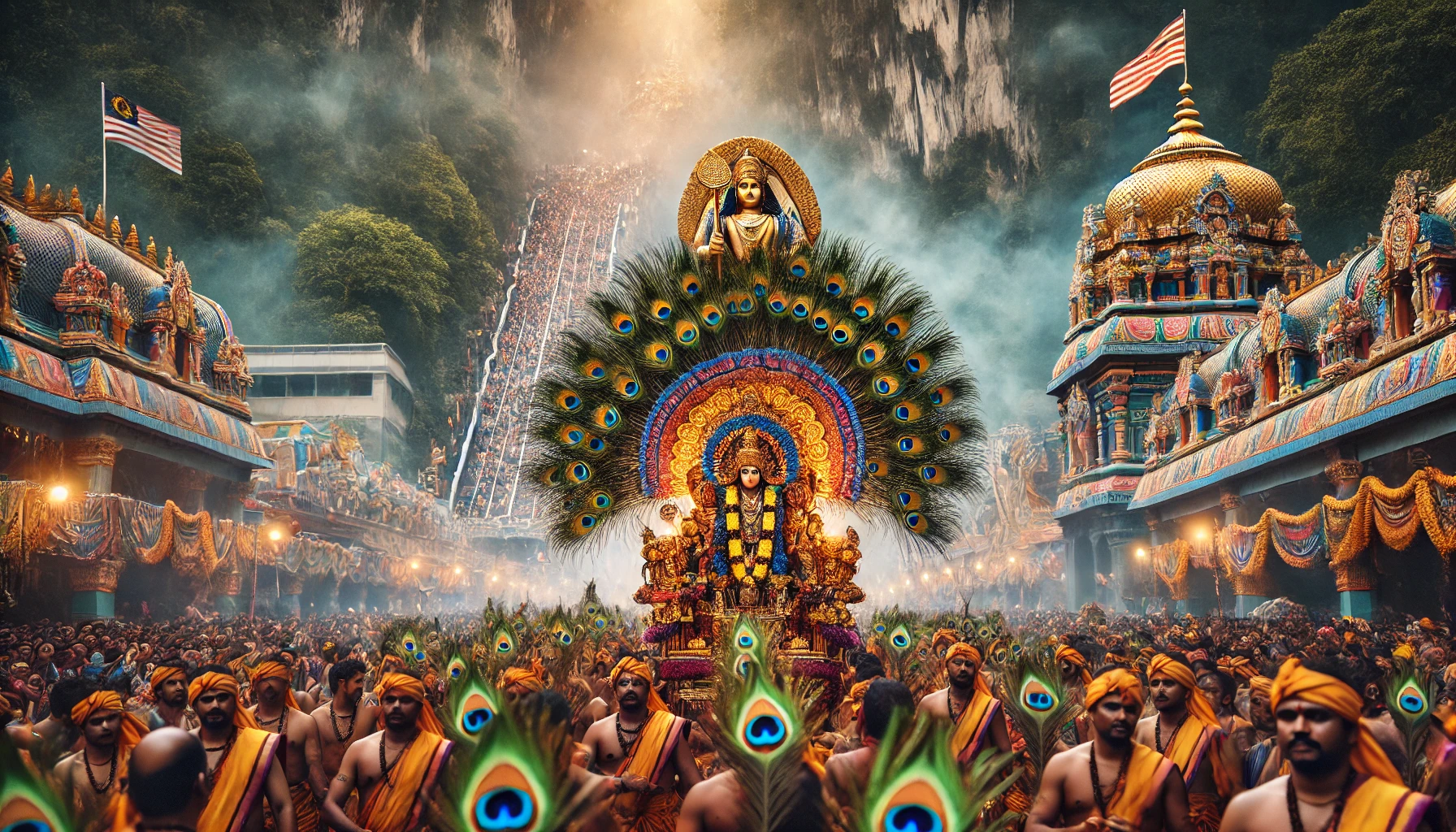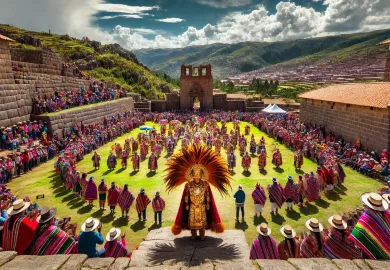
Disclaimer: This content was generated using AI. While I strive for accuracy, I encourage readers to verify important information. I use AI-generated content to increase efficiencies and to provide certain insights, but it may not reflect human expertise or opinions.
Thaipusam is one of the most vibrant and spiritually significant festivals celebrated in Malaysia, drawing millions of devotees and tourists each year. This Hindu festival, marked by fervent devotion, rigorous penance, and spectacular rituals, is a fascinating blend of religious fervor and cultural spectacle. In Malaysia, Thaipusam is celebrated with grand processions and rituals, making it one of the most captivating events in the country’s cultural calendar.
Thaipusam is dedicated to Lord Murugan, the Hindu god of war, who is believed to have vanquished the demon Soorapadman on this day. The festival is a symbol of the triumph of good over evil, and it is a time when devotees seek blessings, fulfill vows, and offer thanks to the deity. In Malaysia, Thaipusam is observed with particular zeal in the states of Selangor, Penang, and Perak, with the Batu Caves in Selangor being the epicenter of the celebrations.
The Origins and Significance of Thaipusam
Thaipusam’s origins can be traced back to the Tamil communities in South India, and it has been celebrated in Malaysia since the arrival of Indian immigrants during the British colonial era. The festival falls in the Tamil month of Thai (January/February), typically on the full moon day. The word “Thaipusam” is derived from “Thai,” the name of the month, and “Pusam,” the name of a star that is at its highest point during the festival.
The festival is significant as it commemorates the occasion when Parvati, the mother of Murugan, gave him a spear (vel) to vanquish the evil demon Soorapadman. The spear symbolizes the destruction of negative forces and the triumph of good over evil. Devotees believe that Thaipusam is an auspicious time to seek blessings, fulfill vows, and express gratitude to Lord Murugan for answering their prayers.
In Malaysia, Thaipusam has evolved into a unique cultural and religious celebration that reflects the diverse and multicultural nature of the country. While it remains a deeply religious event, it also serves as a platform for cultural expression and community bonding.
The Grand Procession to Batu Caves: A Spiritual Journey
The most iconic aspect of Thaipusam in Malaysia is the grand procession to Batu Caves, a limestone hill with a series of caves and cave temples located in Selangor. The journey to Batu Caves begins at the Sri Mahamariamman Temple in Kuala Lumpur, where a silver chariot carrying the statue of Lord Murugan is taken on a 15-kilometer procession to the caves.
The procession, which can take up to eight hours, is a mesmerizing sight, with thousands of devotees walking barefoot, carrying kavadis (burdens) as an act of penance and devotion. Some devotees pierce their skin, tongue, and cheeks with sharp objects as a form of self-mortification, demonstrating their unwavering faith and dedication to Lord Murugan. The sight of devotees in a trance-like state, often accompanied by drumming and chanting, adds to the spiritual intensity of the event.
The procession culminates at the Batu Caves, where devotees climb 272 steps to reach the temple at the top. The climb is a symbolic journey of purification and spiritual elevation, and it is here that devotees offer prayers, make offerings, and fulfill their vows. The atmosphere at Batu Caves during Thaipusam is electric, with the air filled with the scent of incense, the sound of devotional music, and the sight of colorful garlands and decorations.
The Kavadi Attam: A Dance of Devotion
One of the most striking and visually captivating aspects of Thaipusam is the Kavadi Attam, or the “burden dance.” The Kavadi is a physical burden carried by devotees as a form of penance and offering to Lord Murugan. The word “Kavadi” means “sacrifice at every step,” and the act of carrying a Kavadi is seen as a way to seek penance, fulfill a vow, or express gratitude to the deity.
Kavadis come in various forms, ranging from simple wooden structures adorned with flowers and peacock feathers to elaborate steel frames with intricate decorations. Some Kavadis are mounted with sharp skewers that pierce the devotee’s skin, while others are attached to hooks that dig into the flesh of the back. Despite the physical pain involved, devotees believe that carrying a Kavadi brings them closer to Lord Murugan and helps them overcome personal challenges.
The Kavadi Attam is not just an act of physical endurance; it is also a dance of devotion. Devotees often enter a trance-like state, swaying to the rhythm of drums and music as they carry their Kavadis. The dance is a powerful expression of faith, with each step taken in reverence and submission to the divine. For onlookers, the Kavadi Attam is a poignant reminder of the lengths to which devotees will go to honor their commitments and seek divine blessings.
The Cultural Impact of Thaipusam in Malaysia
Thaipusam is more than just a religious festival; it is a cultural phenomenon that has a profound impact on Malaysian society. The festival is a testament to the rich cultural diversity of Malaysia, where different ethnic and religious communities coexist in harmony. Thaipusam is celebrated not only by Hindus but also by people of other faiths who participate in the festivities as a mark of respect and solidarity.
In addition to its religious significance, Thaipusam has become a major tourist attraction, drawing visitors from around the world. The festival offers a unique glimpse into the vibrant and colorful traditions of the Indian community in Malaysia. The elaborate rituals, the grand processions, and the sheer scale of the event make Thaipusam a must-see spectacle for anyone interested in cultural and religious festivals.
Thaipusam also serves as a platform for social cohesion and community building. The festival brings together people from all walks of life, united in their devotion to Lord Murugan. It is a time when families come together, friendships are strengthened, and the bonds of community are reinforced. The spirit of unity and togetherness that pervades Thaipusam is a reflection of the inclusive and multicultural ethos of Malaysia.
The Environmental and Ethical Considerations of Thaipusam
As Thaipusam continues to grow in scale and popularity, it has also raised environmental and ethical concerns. The large crowds that gather at Batu Caves and other Thaipusam venues generate significant amounts of waste, including plastic bottles, food containers, and other disposable items. The accumulation of waste poses a challenge to local authorities and raises questions about the environmental impact of the festival.
In recent years, there has been a growing awareness of the need to make Thaipusam more environmentally sustainable. Initiatives such as reducing plastic waste, promoting the use of biodegradable materials, and encouraging responsible waste disposal have been introduced to minimize the festival’s ecological footprint. Devotees and organizers are also being encouraged to adopt more eco-friendly practices, such as bringing reusable water bottles and avoiding single-use plastics.
Ethical considerations have also come to the fore, particularly with regard to the practice of self-mortification during the festival. While many devotees see the act of piercing their bodies as a deeply personal expression of faith, there are concerns about the physical and psychological risks involved. Health professionals and religious leaders have called for greater awareness and education on the potential dangers of self-mortification, as well as the need for proper medical supervision during the festival.
Conclusion: The Enduring Spirit of Thaipusam
Thaipusam in Malaysia is a festival that embodies the enduring spirit of devotion, sacrifice, and cultural pride. It is a celebration that transcends religious boundaries and unites people in a shared expression of faith and tradition. Despite the challenges and controversies that may arise, the essence of Thaipusam remains unchanged—a powerful testament to the resilience and spirituality of the human spirit.
As Malaysia continues to evolve as a multicultural nation, Thaipusam stands as a reminder of the rich cultural heritage that defines the country. It is a festival that not only honors the divine but also celebrates the diversity and unity of the Malaysian people. For devotees and observers alike, Thaipusam is a journey of faith, a cultural spectacle, and a profound expression of the human desire for connection with the divine.
As Thaipusam continues to be celebrated with great fervor in Malaysia, it serves as a bridge between the past and the present, linking generations of devotees in a shared experience of faith and tradition. The festival’s enduring appeal lies in its ability to inspire devotion, foster cultural pride, and bring people together in a spirit of unity and celebration. Whether you are a devotee seeking spiritual fulfillment or a visitor eager to witness a unique cultural event, Thaipusam in Malaysia offers an unforgettable experience that resonates long after the festivities have ended.








